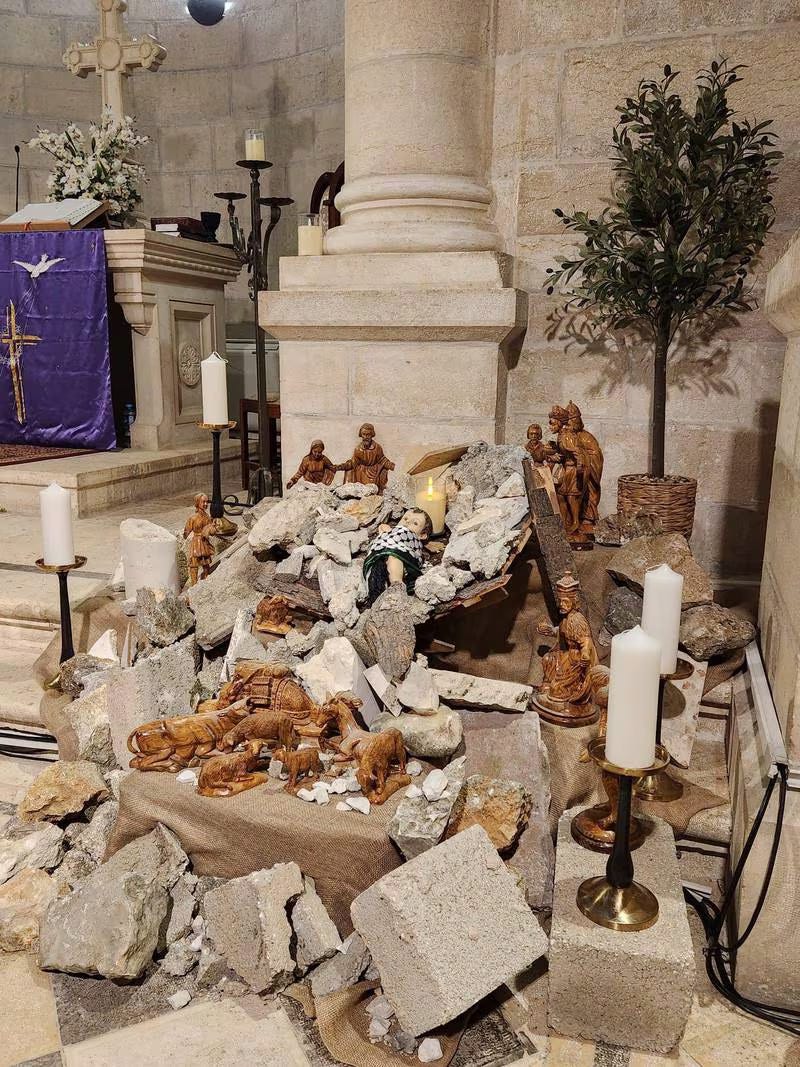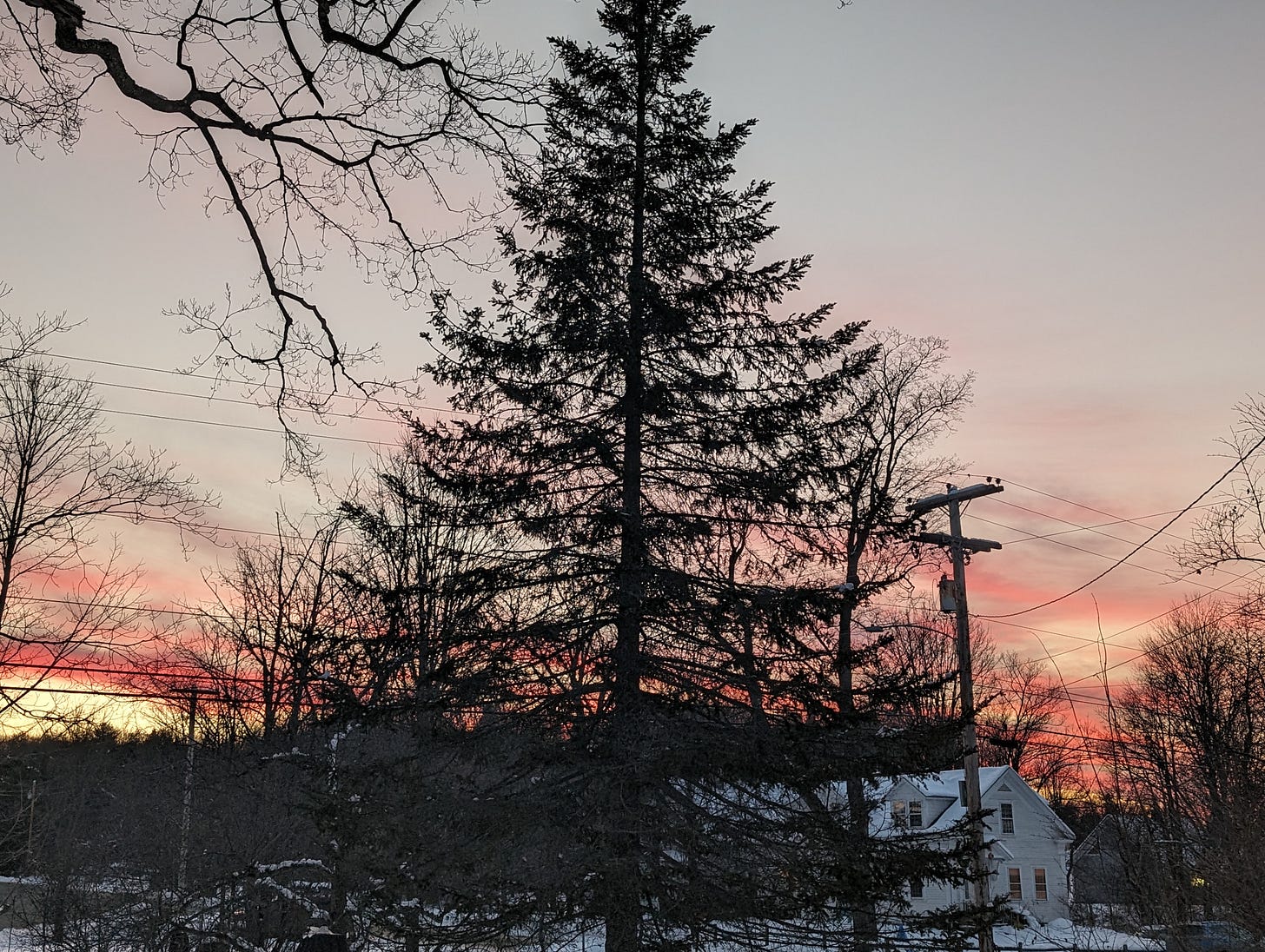Why Him?
The question at the heart of Christmas
Years ago—more than five but less than ten—I was high at All Saints Church in Pasadena, California, on Christmas Eve. This is a confession and a repentance; I can’t and don’t endorse the behavior, and I’m sober now. I’m just being an honest reporter. But also, whatever state you’re in tonight, I very much understand. After all, the preferred Christmas Eve drug of the adults in my church growing up was dinner party wine between services. I just hope you enjoy the candlelight.
I’m not gonna say what I consumed or how much. I’m also not going to tell a story that I was in a pit of despair and Jesus told me to never do a drug or take a “plant medicine” again, because that wasn’t what happened then. I didn’t reconvert to Christianity for a while later. All I’ll say is that I didn’t believe in Jesus at the time, but that night at the flagship Episcopal church made me a true believer in the Spanish version of “Silent Night.” And I got a little too into it. It’s the first and only time I’ve ever heard a stranger lean over and note my singing, which for one reason or another was coming from a Grinch-grown heart. The only other thing I remember is walking back past an even more inebriated guitar-busking Santa Claus in all his holly and jolly glory.
I also remember a bit of the preacher Mike Kinman’s sermon. It was about how Christ’s birth was actually not a silent night, but a messy night. He was talking about the messy realities of birth and the realities of occupied Judea, but it was also true for me that night—I was very messy.
However cliche it is, it’s also true that all of us are a little bit messy. As couples know, some of us have a higher or lower mess tolerance, or maybe the messiest thing about us is how much we can’t stand mess (not naming any loved ones’ names). But we’re all messy. And Christ still comes through and into our mess.
But it does not do to simply downplay the horrors of the world as “messy.” Most of us have probably seen by now the picture from Bethlehem’s Lutheran Evangelical church of Jesus being born into rubble:
As Anglican Church of Canada priest Benjamin Crosby said, “The world that Jesus came to save is this world, a world whose violence prevents celebration of his birth in his birthplace.” As my continued touchstone Thomas Merton said over sixty years ago in his monk’s journal:
Anguish of the word ‘peace’ in our [prayers]. And the realization that it is totally serious, and perfectly simple. Above all our confusions, our violence, our sin, God established His kingdom no mattter what ‘the world’ may do about it. He sends the Prince of Peace.
Some of us can do more about peace than merely (and perhaps helplessly) praying for it. But we do pray, and we must.
This whole Advent, I’ve been raising questions about the “inbreaking” God, the God who comes into our world: what are you waiting for? Where is the Fire? For the doubters, can we believe through each other? And like Mary asked, “Who, me?”
What are we waiting for? For the prophets and angels to show up? If we needed that, even though Christ is already with us, we don’t have that excuse anymore.
Where is the Fire of God? Is it in the charismatic man, even John the Baptist? Maybe we’re asking the church, our country, our soul, where is the true Holy Spirit? Well, it’s here, too. And always was.
All the witnesses we’ll hear about tonight—shepherds, magi, his mom and Dad, people all around who bore witness to a blinding light, an effing angel choir—ask us the same thing. It’s what our ancestors ask too. “If you can’t believe us, can you believe through us?”
Can you believe through them that Christ has come, is coming, is here, and will come again?
Can you believe that Christ is for you and is with you?
Can you believe that Christ wants to make his home in you?
Maybe you’re like Mary, asking, “Who, me?” Why anyone you think is least likely to hold God might be the most likely to hold God? Indeed, why her?
But then eventually, with “the reason for the season” we are forced to ask, ”But why Him?” Why Jesus Christ?
Because Christ is the one who comes when the world has no room for him. Who still comes to Bethlehem even when it’s war-torn—that’s exactly when he comes. Who this very moment, and every day, is coming for you.
Even in those times when we don’t feel God at all, we might ask what measure of truth, and love, and hope, and joy, and peace we have felt and witnessed in the world. For ubi caritas et amor, Deus ibi est, “where there is love and charity, there is God.”
We both know I can’t answer all your questions for you. We may ask, “Why this baby? Why that time? Why that place? Why a Jewish man for all the world?” We can say “because the Bible,” but the mystery is greater.
All we can know is that in this baby, God's new eyes are discovering the world for the first time again, opening with breathless amazement and clenching in the world's agony. God is hungry. God sleeps. God screams. God is now completely covered in our mess and sighs into an abiding peace that we care enough to clean it up. God is rejoicing to feel that humanity can care for God. And God feels the first wounds at our misunderstanding of God's wordless desires. And God forgives us as God begins to teach us in completely new ways, we who think we have known it all and seen it all. Through God's eyes we discover the world for the first time again too.
Why him? Because God has discovered what it's like to be separate from God, and will do anything for us to be reunited with him. Why him? Because of you.






He is here. Now.